
paper-free learning
- conjunctions
- determiners
- interjections
- prepositions
- affect vs effect
- its vs it's
- your vs you're
- which vs that
- who vs whom
- who's vs whose
- averse vs adverse
- 250+ more...
- apostrophes
- quotation marks
- lots more...
- common writing errors
- FAQs by writers
- awkward plurals
- ESL vocabulary lists
- all our grammar videos
- idioms and proverbs
- Latin terms
- collective nouns for animals
- tattoo fails
- vocabulary categories
- most common verbs
- top 10 irregular verbs
- top 10 regular verbs
- top 10 spelling rules
- improve spelling
- common misspellings
- role-play scenarios
- favo(u)rite word lists
- multiple-choice test
- Tetris game
- grammar-themed memory game
- 100s more...

Parts of Speech
What are the parts of speech, a formal definition.
Table of Contents
The Part of Speech Is Determined by the Word's Function
Are there 8 or 9 parts of speech, the nine parts of speech, (1) adjective, (3) conjunction, (4) determiner, (5) interjection, (7) preposition, (8) pronoun, why the parts of speech are important, video lesson.

- You need to dig a well . (noun)
- You look well . (adjective)
- You dance well . (adverb)
- Well , I agree. (interjection)
- My eyes will well up. (verb)
- red, happy, enormous
- Ask the boy in the red jumper.
- I live in a happy place.
- I caught a fish this morning! I mean an enormous one.
- happily, loosely, often
- They skipped happily to the counter.
- Tie the knot loosely so they can escape.
- I often walk to work.
- It is an intriguingly magic setting.
- He plays the piano extremely well.
- and, or, but
- it is a large and important city.
- Shall we run to the hills or hide in the bushes?
- I know you are lying, but I cannot prove it.
- my, those, two, many
- My dog is fine with those cats.
- There are two dogs but many cats.
- ouch, oops, eek
- Ouch , that hurt.
- Oops , it's broken.
- Eek! A mouse just ran past my foot!
- leader, town, apple
- Take me to your leader .
- I will see you in town later.
- An apple fell on his head .
- in, near, on, with
- Sarah is hiding in the box.
- I live near the train station.
- Put your hands on your head.
- She yelled with enthusiasm.
- she, we, they, that
- Joanne is smart. She is also funny.
- Our team has studied the evidence. We know the truth.
- Jack and Jill went up the hill, but they never returned.
- That is clever!
- work, be, write, exist
- Tony works down the pit now. He was unemployed.
- I will write a song for you.
- I think aliens exist .
Are you a visual learner? Do you prefer video to text? Here is a list of all our grammar videos .
Video for Each Part of Speech
The Most Important Writing Issues
The top issue related to adjectives, the top issue related to adverbs.
- Extremely annoyed, she stared menacingly at her rival.
- Infuriated, she glared at her rival.
The Top Issue Related to Conjunctions
- Burger, Fries, and a shake
- Fish, chips and peas
The Top Issue Related to Determiners
The Top Issue Related to Interjections
The top issue related to nouns, the top issue related to prepositions, the top issue related to pronouns, the top issue related to verbs.
- Crack the parts of speech to help with learning a foreign language or to take your writing to the next level.

This page was written by Craig Shrives .
Learning Resources
more actions:
This test is printable and sendable
Help Us Improve Grammar Monster
- Do you disagree with something on this page?
- Did you spot a typo?
Find Us Quicker!
- When using a search engine (e.g., Google, Bing), you will find Grammar Monster quicker if you add #gm to your search term.
You might also like...
Share This Page

If you like Grammar Monster (or this page in particular), please link to it or share it with others. If you do, please tell us . It helps us a lot!
Create a QR Code

Use our handy widget to create a QR code for this page...or any page.
< previous lesson
next lesson >
The 9 Parts of Speech: Definitions and Examples
- Ph.D., Rhetoric and English, University of Georgia
- M.A., Modern English and American Literature, University of Leicester
- B.A., English, State University of New York
A part of speech is a term used in traditional grammar for one of the nine main categories into which words are classified according to their functions in sentences, such as nouns or verbs. Also known as word classes, these are the building blocks of grammar.
Every sentence you write or speak in English includes words that fall into some of the nine parts of speech. These include nouns, pronouns, verbs, adjectives, adverbs, prepositions, conjunctions, articles/determiners, and interjections. (Some sources include only eight parts of speech and leave interjections in their own category.)
Parts of Speech
- Word types can be divided into nine parts of speech:
- prepositions
- conjunctions
- articles/determiners
- interjections
- Some words can be considered more than one part of speech, depending on context and usage.
- Interjections can form complete sentences on their own.
Learning the names of the parts of speech probably won't make you witty, healthy, wealthy, or wise. In fact, learning just the names of the parts of speech won't even make you a better writer. However, you will gain a basic understanding of sentence structure and the English language by familiarizing yourself with these labels.
Open and Closed Word Classes
The parts of speech are commonly divided into open classes (nouns, verbs, adjectives, and adverbs) and closed classes (pronouns, prepositions, conjunctions, articles/determiners, and interjections). Open classes can be altered and added to as language develops, and closed classes are pretty much set in stone. For example, new nouns are created every day, but conjunctions never change.
In contemporary linguistics , parts of speech are generally referred to as word classes or syntactic categories. The main difference is that word classes are classified according to more strict linguistic criteria. Within word classes, there is the lexical, or open class, and the function, or closed class.
The 9 Parts of Speech
Read about each part of speech below, and practice identifying each.
Nouns are a person, place, thing, or idea. They can take on a myriad of roles in a sentence, from the subject of it all to the object of an action. They are capitalized when they're the official name of something or someone, and they're called proper nouns in these cases. Examples: pirate, Caribbean, ship, freedom, Captain Jack Sparrow.
Pronouns stand in for nouns in a sentence . They are more generic versions of nouns that refer only to people. Examples: I, you, he, she, it, ours, them, who, which, anybody, ourselves.
Verbs are action words that tell what happens in a sentence. They can also show a sentence subject's state of being ( is , was ). Verbs change form based on tense (present, past) and count distinction (singular or plural). Examples: sing, dance, believes, seemed, finish, eat, drink, be, became.
Adjectives describe nouns and pronouns. They specify which one, how much, what kind, and more. Adjectives allow readers and listeners to use their senses to imagine something more clearly. Examples: hot, lazy, funny, unique, bright, beautiful, poor, smooth.
Adverbs describe verbs, adjectives, and even other adverbs. They specify when, where, how, and why something happened and to what extent or how often. Many adjectives can be turned into adjectives by adding the suffix - ly . Examples: softly, quickly, lazily, often, only, hopefully, sometimes.
Preposition
Prepositions show spatial, temporal, and role relations between a noun or pronoun and the other words in a sentence. They come at the start of a prepositional phrase , which contains a preposition and its object. Examples: up, over, against, by, for, into, close to, out of, apart from.
Conjunction
Conjunctions join words, phrases, and clauses in a sentence. There are coordinating, subordinating, and correlative conjunctions. Examples: and, but, or, so, yet.
Articles and Determiners
Articles and determiners function like adjectives by modifying nouns, but they are different than adjectives in that they are necessary for a sentence to have proper syntax. Articles and determiners specify and identify nouns, and there are indefinite and definite articles. Examples of articles: a, an, the ; examples of determiners: these, that, those, enough, much, few, which, what.
Some traditional grammars have treated articles as a distinct part of speech. Modern grammars, however, more often include articles in the category of determiners , which identify or quantify a noun. Even though they modify nouns like adjectives, articles are different in that they are essential to the proper syntax of a sentence, just as determiners are necessary to convey the meaning of a sentence, while adjectives are optional.
Interjection
Interjections are expressions that can stand on their own or be contained within sentences. These words and phrases often carry strong emotions and convey reactions. Examples: ah, whoops, ouch, yabba dabba do!
How to Determine the Part of Speech
Only interjections ( Hooray! ) have a habit of standing alone; every other part of speech must be contained within a sentence and some are even required in sentences (nouns and verbs). Other parts of speech come in many varieties and may appear just about anywhere in a sentence.
To know for sure what part of speech a word falls into, look not only at the word itself but also at its meaning, position, and use in a sentence.
For example, in the first sentence below, work functions as a noun; in the second sentence, a verb; and in the third sentence, an adjective:
- Bosco showed up for work two hours late.
- The noun work is the thing Bosco shows up for.
- He will have to work until midnight.
- The verb work is the action he must perform.
- His work permit expires next month.
- The attributive noun (or converted adjective) work modifies the noun permit .
Learning the names and uses of the basic parts of speech is just one way to understand how sentences are constructed.
Dissecting Basic Sentences
To form a basic complete sentence, you only need two elements: a noun (or pronoun standing in for a noun) and a verb. The noun acts as a subject, and the verb, by telling what action the subject is taking, acts as the predicate.
In the short sentence above, birds is the noun and fly is the verb. The sentence makes sense and gets the point across.
You can have a sentence with just one word without breaking any sentence formation rules. The short sentence below is complete because it's a verb command with an understood "you" noun.
Here, the pronoun, standing in for a noun, is implied and acts as the subject. The sentence is really saying, "(You) go!"
Constructing More Complex Sentences
Use more parts of speech to add additional information about what's happening in a sentence to make it more complex. Take the first sentence from above, for example, and incorporate more information about how and why birds fly.
- Birds fly when migrating before winter.
Birds and fly remain the noun and the verb, but now there is more description.
When is an adverb that modifies the verb fly. The word before is a little tricky because it can be either a conjunction, preposition, or adverb depending on the context. In this case, it's a preposition because it's followed by a noun. This preposition begins an adverbial phrase of time ( before winter ) that answers the question of when the birds migrate . Before is not a conjunction because it does not connect two clauses.
- Sentence Parts and Sentence Structures
- 100 Key Terms Used in the Study of Grammar
- Closed Class Words
- Word Class in English Grammar
- Prepositional Phrases in English Grammar
- Foundations of Grammar in Italian
- The Top 25 Grammatical Terms
- Open Class Words in English Grammar
- Pronoun Definition and Examples
- What Is an Adverb in English Grammar?
- Telegraphic Speech
- What Are the Parts of a Prepositional Phrase?
- Parts of Speech Printable Worksheets
- Definition and Examples of Function Words in English
- Lesson Plan: Label Sentences with Parts of Speech
- Nominal: Definition and Examples in Grammar
- English Grammar
- Parts of Speech
Parts of Speech - Definition, 8 Types and Examples
In the English language , every word is called a part of speech. The role a word plays in a sentence denotes what part of speech it belongs to. Explore the definition of parts of speech, the different parts of speech and examples in this article.
Table of Contents
Parts of speech definition, different parts of speech with examples.
- Sentences Examples for the 8 Parts of Speech
A Small Exercise to Check Your Understanding of Parts of Speech
Frequently asked questions on parts of speech, what is a part of speech.
Parts of speech are among the first grammar topics we learn when we are in school or when we start our English language learning process. Parts of speech can be defined as words that perform different roles in a sentence. Some parts of speech can perform the functions of other parts of speech too.
- The Oxford Learner’s Dictionary defines parts of speech as “one of the classes into which words are divided according to their grammar, such as noun, verb, adjective, etc.”
- The Cambridge Dictionary also gives a similar definition – “One of the grammatical groups into which words are divided, such as noun, verb, and adjective”.
Parts of speech include nouns, pronouns, verbs, adverbs, adjectives, prepositions, conjunctions and interjections.
8 Parts of Speech Definitions and Examples:
1. Nouns are words that are used to name people, places, animals, ideas and things. Nouns can be classified into two main categories: Common nouns and Proper nouns . Common nouns are generic like ball, car, stick, etc., and proper nouns are more specific like Charles, The White House, The Sun, etc.
Examples of nouns used in sentences:
- She bought a pair of shoes . (thing)
- I have a pet. (animal)
- Is this your book ? (object)
- Many people have a fear of darkness . (ideas/abstract nouns)
- He is my brother . (person)
- This is my school . (place)
Also, explore Singular Nouns and Plural Nouns .
2. Pronouns are words that are used to substitute a noun in a sentence. There are different types of pronouns. Some of them are reflexive pronouns, possessive pronouns , relative pronouns and indefinite pronouns . I, he, she, it, them, his, yours, anyone, nobody, who, etc., are some of the pronouns.
Examples of pronouns used in sentences:
- I reached home at six in the evening. (1st person singular pronoun)
- Did someone see a red bag on the counter? (Indefinite pronoun)
- Is this the boy who won the first prize? (Relative pronoun)
- That is my mom. (Possessive pronoun)
- I hurt myself yesterday when we were playing cricket. (Reflexive pronoun)
3. Verbs are words that denote an action that is being performed by the noun or the subject in a sentence. They are also called action words. Some examples of verbs are read, sit, run, pick, garnish, come, pitch, etc.
Examples of verbs used in sentences:
- She plays cricket every day.
- Darshana and Arul are going to the movies.
- My friends visited me last week.
- Did you have your breakfast?
- My name is Meenakshi Kishore.
4. Adverbs are words that are used to provide more information about verbs, adjectives and other adverbs used in a sentence. There are five main types of adverbs namely, adverbs of manner , adverbs of degree , adverbs of frequency , adverbs of time and adverbs of place . Some examples of adverbs are today, quickly, randomly, early, 10 a.m. etc.
Examples of adverbs used in sentences:
- Did you come here to buy an umbrella? (Adverb of place)
- I did not go to school yesterday as I was sick. (Adverb of time)
- Savio reads the newspaper everyday . (Adverb of frequency)
- Can you please come quickly ? (Adverb of manner)
- Tony was so sleepy that he could hardly keep his eyes open during the meeting. (Adverb of degree)
5. Adjectives are words that are used to describe or provide more information about the noun or the subject in a sentence. Some examples of adjectives include good, ugly, quick, beautiful, late, etc.
Examples of adjectives used in sentences:
- The place we visited yesterday was serene .
- Did you see how big that dog was?
- The weather is pleasant today.
- The red dress you wore on your birthday was lovely.
- My brother had only one chapati for breakfast.
6. Prepositions are words that are used to link one part of the sentence to another. Prepositions show the position of the object or subject in a sentence. Some examples of prepositions are in, out, besides, in front of, below, opposite, etc.
Examples of prepositions used in sentences:
- The teacher asked the students to draw lines on the paper so that they could write in straight lines.
- The child hid his birthday presents under his bed.
- Mom asked me to go to the store near my school.
- The thieves jumped over the wall and escaped before we could reach home.
7. Conjunctions are a part of speech that is used to connect two different parts of a sentence, phrases and clauses . Some examples of conjunctions are and, or, for, yet, although, because, not only, etc.
Examples of conjunctions used in sentences:
- Meera and Jasmine had come to my birthday party.
- Jane did not go to work as she was sick.
- Unless you work hard, you cannot score good marks.
- I have not finished my project, yet I went out with my friends.
8. Interjections are words that are used to convey strong emotions or feelings. Some examples of interjections are oh, wow, alas, yippee, etc. It is always followed by an exclamation mark.
Examples of interjections used in sentences:
- Wow ! What a wonderful work of art.
- Alas ! That is really sad.
- Yippee ! We won the match.
Sentence Examples for the 8 Parts of Speech
- Noun – Tom lives in New York .
- Pronoun – Did she find the book she was looking for?
- Verb – I reached home.
- Adverb – The tea is too hot.
- Adjective – The movie was amazing .
- Preposition – The candle was kept under the table.
- Conjunction – I was at home all day, but I am feeling very tired.
- Interjection – Oh ! I forgot to turn off the stove.
Let us find out if you have understood the different parts of speech and their functions. Try identifying which part of speech the highlighted words belong to.
- My brother came home late .
- I am a good girl.
- This is the book I was looking for.
- Whoa ! This is amazing .
- The climate in Kodaikanal is very pleasant.
- Can you please pick up Dan and me on your way home?
Now, let us see if you got it right. Check your answers.
- My – Pronoun, Home – Noun, Late – Adverb
- Am – Verb, Good – Adjective
- I – Pronoun, Was looking – Verb
- Whoa – Interjection, Amazing – Adjective
- Climate – Noun, In – Preposition, Kodaikanal – Noun, Very – Adverb
- And – Conjunction, On – Preposition, Your – Pronoun
What are parts of speech?
The term ‘parts of speech’ refers to words that perform different functions in a sentence in order to give the sentence a proper meaning and structure.
How many parts of speech are there?
There are 8 parts of speech in total.
What are the 8 parts of speech?
Nouns, pronouns, verbs, adverbs, adjectives, prepositions, conjunctions and interjections are the 8 parts of speech.
Leave a Comment Cancel reply
Your Mobile number and Email id will not be published. Required fields are marked *
Request OTP on Voice Call
Post My Comment
- Share Share
Register with BYJU'S & Download Free PDFs
Register with byju's & watch live videos.
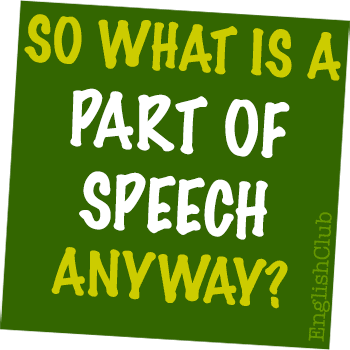
Parts of Speech
What is a Part of Speech?
We can categorize English words into 9 basic types called "parts of speech" or "word classes". It's quite important to recognize parts of speech. This helps you to analyze sentences and understand them. It also helps you to construct good sentences.
Parts of Speech Table
Parts of speech examples.
- Parts of Speech Quiz
This is a summary of the 9 parts of speech*. You can find more detail if you click on each part of speech.
- lexical Verbs ( work, like, run )
- auxiliary Verbs ( be, have, must )
- Determiners may be treated as adjectives, instead of being a separate part of speech.
Here are some examples of sentences made with different English parts of speech:
Here is a sentence that contains every part of speech:
Words with More Than One Job
Many words in English can have more than one job, or be more than one part of speech. For example, "work" can be a verb and a noun; "but" can be a conjunction and a preposition; "well" can be an adjective, an adverb and an interjection. In addition, many nouns can act as adjectives.
To analyze the part of speech, ask yourself: "What job is this word doing in this sentence?"
In the table below you can see a few examples. Of course, there are more, even for some of the words in the table. In fact, if you look in a good dictionary you will see that the word " but " has six jobs to do:
- verb, noun, adverb, pronoun, preposition and conjunction!
People often ask
FAQ: frequently asked parts of speech questions
Pasco-Hernando State College
Parts of a Sentence
- Punctuation
- Parts of Speech
- Sentence Variety
- Problems with Sentences
Related Pages
- Sentence Structure
What is a Sentence?
A sentence must contain a subject and a predicate . The subject must contain a noun or nominal word, and the predicate must contain a verb. A sentence can be as simple as a noun and a verb.
- Example: Birds fly.
The subject can contain more than a noun, and the predicate can contain more than a verb.
- Example: Migratory birds fly to Florida.
In the above example, the subject contains an adjective ( migratory ) and a noun ( birds ), and the predicate contains a verb ( fly ), a preposition ( to ), and a direct object ( Florida ).
In this section we will examine the different parts of a sentence including: subject, predicate, object, complement, phrase, and clause.
- Printer-friendly version

GrammarSimple.Com
40 Examples of Direct and Indirect Speech Sentences
Table of Contents
Direct And Indirect Speech Examples
While using English, we use direct and indirect speeches quite often. If a sentence is expressed exactly as it came out of the mouth of the person who said it, it becomes a direct speech. However Indirect Speech (also called reported speech) refers to transmitting a sentence that someone has said. It is often used in daily language.
For example,
- Susan told me she ate pizza yesterday. (Indirect Speech)
Susan said, “I ate pizza yesterday.”. (Direct Speech)
- Mathilda told me she had to go out. (Indirect Speech)
Mathilda said: “I have to go out.”. (Direct Speech)
- Julie asked if the train had left when she arrived at the ticket office. (Indirect Speech)
Julie asked: “Did the train leave?” (Direct Speech)
Related Posts
Active and Passive Voice Examples For All Tenses
Using Both, Definition and Example Sentences
Sentence Fragment Meaning, Definition and Sentence Fragment Examples
About the author.
EnglishGrammarSoft
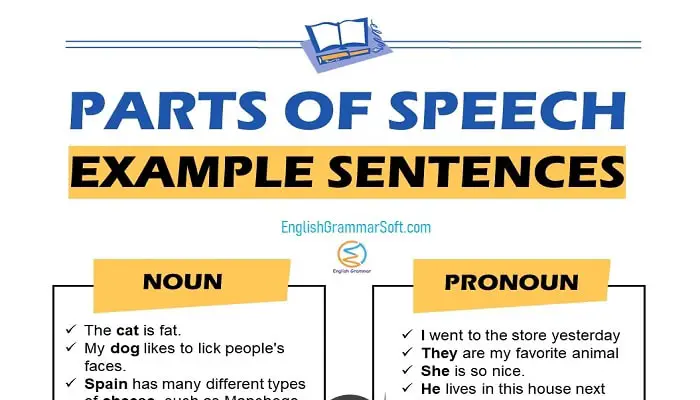
The Parts of Speech Examples (127 Mixed Sentences)
What are parts of speech.
Parts of speech are the building blocks or components of a sentence. All words belong to one part of speech or another; there are eight parts of speech in all. Knowing what they are will help you choose your words wisely and use them correctly in your writing.
Parts of Speech Examples
Nouns sentences.
- The cat is fat.
- My dog likes to lick people’s faces.
- A house can be a place for living or an investment property.
- Spain has many different types of cheese , such as Manchego and Idiazabal.
- I need some apples for my lunch today.
- My parents live in North America.
- I like to eat bananas for breakfast.
- I like to put jam on toast .
- Fruits are my favorite dessert.
- We were ordered to carry sacks of rice across the river .
- The best way to start a business is to know what you need before beginning.
- Always look at the big picture when creating a product .
- I recently met your brother ’s girlfriend .
- The newly elected president was sworn in on January 12th, 2019.
- He quickly walked out of the room .
Pronouns Sentences
- I went to the store yesterday
- They are my favorite animal
- She is so nice.
- He lives in this house next door.
- I have my own car.
- She may go to Hawaii next month.
- The man who helped us is my brother.
- They are here somewhere.
- He played for years before he became famous.
- Did you like the film?
- He plays the guitar.
- You are an important part of this project.
- His dog is cute.
- I love the new dress you bought.
- You are always helping me with my work, thanks!
You may also like: Parts of Speech Free Posters
Verb Sentences
- She puts the entire responsibility on him.
- I went to the mall.
- He decided to pursue his dream to become a drummer on its own.
- She spoke for an hour.
- They suggested an alternative.
- We showed them around.
- The match made it three on the bounce.
- You were told to hold tight, but you leant back on the rope and fell over.
- They finally agreed on a price with their business partner, after several months of negotiation.
- Did he order a lobster or a steak?
- I like to workout at home.
- She decided to start running.
- I would like to take a vacation.
- They wanted to go camping.
- You should work on your Spanish.
- It’s important to learn how to cook basic meals.
- I like to look at the stars and plan my day tomorrow.
- My first job out of college was as an assistant manager at Starbucks and I loved it.
- Furthermore, I would work hard on my new business and close the gap between my income and how much I was spending.
- She founded her first business as a result of moving to a new town, where she needed a way to meet new people.
Adverb Sentences
- Steve will always say what he thinks.
- I am waiting patiently for my pay rise.
- She left very quickly .
- The bill was paid promptly .
- I will definitely complete it soon.
- And they did it immediately .
- Lisa presently earns more money.
- It is finally finished.
- The medicine only works temporarily.
- She was totally exhausted after the ordeal.
- She immediately cancelled her membership.
- We eventually found a solution.
- Their voices were gradually fading away.
- I will gladly help you whenever you need it.
- She hasn’t been very consistent at sleeping lately .
Adjectives Sentences
- She is the kindest person in the class.
- I need a new dress for the party.
- This is the coldest winter we have ever had.
- The tree was full of green leaves.
- You are the most beautiful person ever!
- The fox was funny with its big bushy tail!
- The large conference table was perfectly suited for the big conference room.
- The small desk was perfectly suited for the small office.
- The purple chair was perfectly suited for the pink room.
- The long conference table was not suited for the short conference room.
- The blue chair was not suited for the yellow room.
- The wooden desk was not suited for the carpeted floor.
- The big table is perfect for the big meeting room.
- Sometimes drastic measures are necessary to turn a company around.
- The government needs to understand the gravity of the economic crisis.
Preposition Sentences
- The book is lying on the table.
- I’m going to put a piece of paper below this book.
- He went to the hospital.
- I have to work on Saturday.
- The world champion spoke with the President of Brazil about corruption in sport.
- The stove burst open with a bang.
- She didn’t want to do so without her brother.
- The dog seemed very happy to meet you.
- She came out the door crying.
- On average, people sleep for 8 hours each night.
- Your flight leaves in 20 minutes.
- She presided over the meeting.
- We are behind schedule.
- We are running late for work.
- It’s in front of the house.
- It’s located in front of our home.
- This is a project about leadership.
- One way to get there is by setting goals.
- That’s the purpose of this site.
Conjunction Sentences
- I went to the cinema, but I didn’t enjoy it.
- I was really tired during the day, so I woke up later than usual. And when I woke up, I had no time to get ready for school.
- He waited a long time, but his parents did not come back home.
- Choose a number from 1-10 and write its name in the box.
- I love this dress, but there are no sleeves.
- These tacos are tasty but they are spicy.
- She is a top actress as well as a social worker.
- She walked in with her friends, but left alone the moment she saw the crowd waiting for autographs at the entrance of the theatre.
- It is also important that the media covers all sides of the story.
- Finally, economy will diminish because many companies will go bankrupt if they are not able to remain competitive.
- Writers are supposed to be excited about what they are writing about.
Interjection Sentences
- Wow! I can’t believe I won!
- Yay, it’s the weekend!
- Aww, you’re so sweet.
- Yikes, that’s a lot of work.
- Oops, I forgot my wallet!
- Wow! I can’t believe I hit the jackpot!
- Be careful! You might fall off that ladder!
- It’s amazing! We won the lottery!
- Yay! We have a better looking lawn than our neighbors.
- How fun! We have been randomly selected to win two free tickets to a rock concert.
- Aww, poor little one, did you hurt yourself?
- Wow! I can’t believe I got an “A” on my math test!
- Oh how exciting! Prize money awaits!
- Yippee! We’ve hit the jackpot!
- Thanks for your help! I’m having so much fun up here.
- Oh, man! I can’t wait for the weekend!
- Yay, I’m so excited!
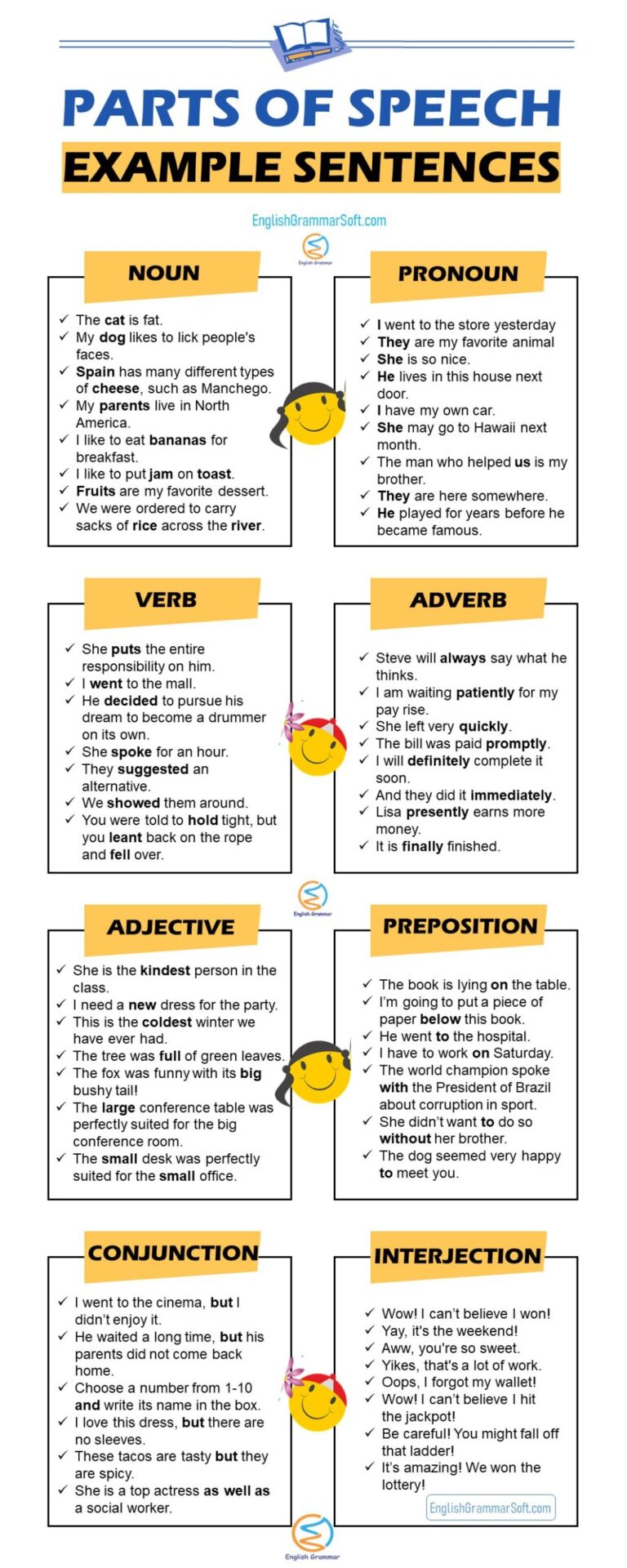
Further Reading
- 8 Parts of Speech with Examples | An Easy Guide for you
- Parts of Speech Exercises [Worksheet] with Answers
- Parts of Speech Lesson Plans
- Nouns | What are 11 Types of Nouns? Explain with Examples | Useful Guide
- Pronoun | What does pronoun mean? Different Types of Pronouns with 60+ Perfect Examples
- How do you describe adjectives? 13 Types of Adjectives with Examples
- What does adverb mean? 11 Types of Adverb with Examples
What is a preposition? Types of Preposition According to Function
What are the verbs in english | types of verbs and examples.
- What are the 4 types of conjunctions? | Conjunction rules with examples
- Adjectives Exercises with Answers
Preposition Usage and Examples
- Interjections Definition and Examples | Interjections Anchor Chart

Similar Posts
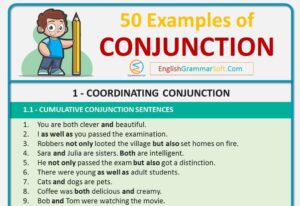
Conjunction Sentences (50 Examples)
50 Conjunction Sentences We have narrated conjunction sentences. You will find here examples of all types of conjunctions. Let’s start! 1 – Coordinating Conjunction:- 1.1…

What are the verbs in English? The verb is concerned with doing and being. Its function is to make a statement, to ask questions, and…
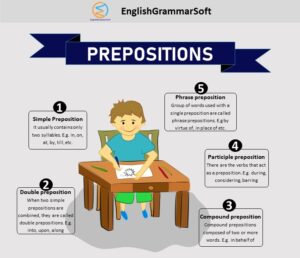
In this post, we are covering preposition, its types with examples and rules. Following points will be covered. What is a preposition? List of Prepositions…
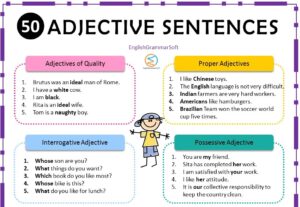
Sentences of Adjectives (50 Examples)
Sentences of Adjectives Sentences of Adjectives of Quality Brutus was an ideal man of Rome. I have a white cow. I am black. Rita is an ideal wife. Tom is…
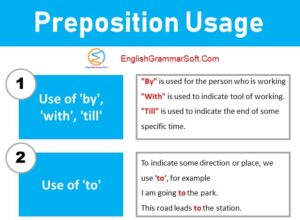
A preposition is used to show the relation of one thing to another. It connects a noun or a pronoun with a verb, adjective, pronoun…
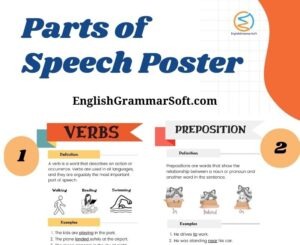
Parts of Speech Posters (Free Printables)
Parts of speech posters are a great way to reinforce language arts skills in your classroom. Students can use these posters to help them identify…
Leave a Reply Cancel reply
Your email address will not be published. Required fields are marked *
Save my name, email, and website in this browser for the next time I comment.

15 Powerful Speech Ending Lines (And Tips to Create Your Own)
Hitiksha jain.
- Public Speaking , Speech Writing

A powerful speech ending line helps you recapture the essence of your speech: your main points and the purpose of why you spoke.
Basically, it is a summary of your dominant points.
The words you say at the beginning, and especially at the end of your talk will be remembered longer than any other part of your speech. (This doesn’t mean the body of your speech has no importance.)
The beginning of your speech needs to be strong because it grips the attention of your audience. If that falls apart, they might lose interest in your speech. To avoid such a situation, here’s an article on 15 Powerful Speech Opening Lines (And How to Create Your Own) that you can refer to.
It has happened time after time- a speaker has concluded his speech with no conclusion or a simple “Thank you!” which made their impactful and amazing speech entirely fall apart.
An ineffective conclusion or no conclusion makes your speech lose its charm and the energy that has been created. This leaves your audience in a state of confusion and disappointment.
Remember, the conclusion of your speech is NOT the time to introduce new points or new supporting evidence; doing so will all the more confuse the listeners.
Instead, a conclusion is like tying a bow or ribbon to a box of your key ideas that your audience will be taking along with them. Meaning, it’s the final touch that makes your speech stand out and memorable.
So, how can you end your speech with a bang? To discover it, let’s jump in to the 15 powerful speech ending lines and ways to create your own:
1) Abraham Lincoln
Speech ending line: “And this nation under God shall have a new birth of freedom and that government of the people, by the people, for the people shall not perish from the Earth.”
How to use The Rule Of Three to end your speech?
The Rule of Three is an effective technique that allows you to express your ideas more completely by emphasizing your points and increasing the memorability of your message.
Dale Carneige once said,
“Tell them what you are going to tell them, tell them, then tell them what you just told them.”
Information when presented in a group of three sticks in our head better than say, groups of four or five.
The answer is simple! We humans are generally good at pattern recognition and three is the smallest number needed to make a pattern. When used at the end of a speech, you can create maximum impact, (obviously) if said in a proper tone of voice.
Repeating your ideas can make your message more persuasive, memorable, and entertaining.
Since, the conclusion is your last chance as a speaker to drive home your ideas, you need to repeat and emphasize phrases, sentences and words to make others remember your key message.
The repetition of phrases and sentences should be such that it creates a micro story of your entire speech.
If you are trying to incorporate the rule of three in your speech and need guidance to do so. Here’s an article on The Power of the Rule of Three in Speech Writing that might help you!
2) Simon Sinek
Speech ending line: “Listen to politicians now, with their comprehensive 12-point plans. They’re not inspiring anybody. Because there are leaders and there are those who lead. Leaders hold a position of power or authority, but those who lead inspire us. Whether they’re individuals or organizations, we follow those who lead, not because we have to, but because we want to. We follow those who lead, not for them, but for ourselves. And it’s those who start with “why” that have the ability to inspire those around them or find others who inspire them.”
How to mark an end of a speech with a story?
Telling stories can do wonders in making your speech a memorable one. Because we as humans relate to stories.
Using an effective and persuasive story at the end can engage the audience, evoke empathy, increase trust and motivate action.
Your story should be crafted in such a way that it sums up your entire speech. But don’t forget, it needs to be short and sweet.
You can start your story by saying, “Let me tell you a story that illustrates what I have been talking about…”
To make your speech/story worth remembering, you can try these various storytelling approaches mentioned in this article- 9 Storytelling Approaches For Your Next Speech or Presentation .
3) Les Brown
Speech ending line: “If you want a thing bad enough To go out and fight for it, Work day and night for it, Give up your time and your peace and Your sleep for it
If only desire of it Makes you quite mad enough Never to tire of it, Makes you hold all other things tawdry And cheap for it
If life seems all empty and useless without it And all that you scheme and you dream is about it,
If gladly you’ll sweat for it, Fret for it, Plan for it, Lose all your terror of God or man for it,
If you’ll simply go after that thing that you want. With all your capacity, Strength and sagacity, Faith, hope and confidence, stern pertinacity,
If neither cold, poverty, famished and gaunt, Nor sickness nor pain Of body or brain Can turn you away from the thing that you want,
If dogged and grim you besiege and beset it, You’ll get it.”
How to end a speech with a poem?
This works similar to the notion of storytelling.
You can end your speech with a poem that summarizes your entire speech. To do this you can either make your own or select the one that works the best for your speech. If you select one, remember to cite the source.
While reciting a poem add emotions and drama to your words, raise your voice on a key line of the poem and pause whenever required.
Poetry is a powerful way to get your point across because it helps you create an impression in your audiences’ mind. If you are planning to tap into poetry for your next speech, we have written an article- Getting Your ‘Wordsworth’: Poetry in Public Speaking that you can review to get some tips on how to add a poem in your speech.
4) Sir Ken Robinson
Speech ending line: “There’s a wonderful quote from Benjamin Franklin. “There are three sorts of people in the world: Those who are immovable, people who don’t get it, or don’t want to do anything about it; there are people who are movable, people who see the need for change and are prepared to listen to it; and there are people who move, people who make things happen.” And if we can encourage more people, that will be a movement. And if the movement is strong enough, that’s, in the best sense of the word, a revolution. And that’s what we need.”
How to close a speech with a memorable quote?
Quotations are usually concise and memorable phrasing of an idea. (This is why we repeat and remember quotations, right?)
The sole reason to quote material is that it reinforces your ideas. A quotation offers a second voice echoing your claims which is more powerful than simply just repeating yourself.
So, your quote should be such that summarizes your main idea. You can quote words of an expert, a person who spoke before you at an event or something in your own words.
Tips for using quotations in your speech:
- Phrasing it correctly can help boost your credibility
- Don’t quote anything outside your context
Taking the above example of Sir Ken Robinson, the quoted words at the end of his speech summarized the heart of his speech.
5) Lera Boroditsky
Speech ending line: “It’s how the language that you speak shapes the way that you think. And that gives you the opportunity to ask, “Why do I think the way that I do?” “How could I think differently?” And also, “What thoughts do I wish to create?”
How to end a speech with a question?
You can try and engage your audience with questions that will get them thinking.
It is often effective to end with a rhetorical question that captures the message and leaves the audience thinking—especially one that directly ties in your CTA. For instance:
“What choice will you make when you leave here today? Will you ____(your key message), or will you go about your normal routine?”
See how Lera Boroditsky leaves her audience with a set of questions rattling around their minds.
6) Melissa Butler
Speech ending line: “So I challenge each of you, when you go home today, look at yourself in the mirror, see all of you, look at all of your greatness that you embody, accept it, and love it. And finally, when you leave the house tomorrow, try to extend that same love and acceptance to someone who doesn’t look like you. Thank you.”
How to give a challenge close to your speech?
In the above example, Melissa Butler used a challenge close to force her audience to take action over something.
In this type of closing, you challenge your audience to apply whatever you spoke in your speech and engage them in thought or action.
A good way to do that is to make sure they know you’re aware of the challenges that exist, and that you have concrete and actionable solutions to it.
To do this, you can have a bit of a forceful tone of voice to make a failure process a learning one.
Do express your belief in them and focus on setting a high bar, but an achievable one.
7) Brian Kateman
Speech ending line: “You can change the world by ordering a smaller steak, or doing something more. But don’t just sit by and ignore what you already know. Consider eating less meat and be a reducetarian.
Save our planet, improve your health, and save a lot of animals.”
How to end a speech by giving a solution to a concern?
This type of closing is suitable for speeches where you talk about a problem and give a solution for the same.
First you introduce the problem and explain why the audience should be concerned about it.
While concluding, you provide a practical solution to the stated concern.
Look at how Brian Kateman states a problem: The battle between vegans, vegetarians, and everyone else and ends up giving a pragmatic solution.
8) Anjelah Johnson
Speech ending line: “Really?! It’s funny because my finger didn’t do like that before I came in here.” “It’s okay honey, don’t worry. I’ll fix it for you, don’t worry.” (Imitates talking in Vietnamese) (Laughter) (Laughter) (Stops talking Vietnamese) “Oh, see? You look so pretty!” God bless, you guys.”
How to leave your audience with a good laugh?
Wouldn’t you love leaving your audience with a good laugh? Ending your speech with humor can help you to do so.
But you need to use them with caution. Tell jokes that are related to your speech. And avoid telling offensive jokes.
You can add anecdotes and funny stories that have happened in real life since it’s easy to relate to and, if said in a correct manner, you can have your audience laughing while hitting your message home!
Tips to deliver a good humor:
- Surprise your audience by breaking their expectations with the help of a good setup and punchline. Setup creates a specific expectation in people’s minds and a punchline reveals the surprise. For instance, “I believe that each person can make a difference (setup), but it’s so slight that there’s basically no point (punch)”
- Try and impersonate your dialogues or the characters as it will make your listeners feel they are in the scene
- You can twist the literal meaning of a word. Example- Everybody looked up to me in college because I was the tallest of all
- You can also incorporate the rule of three that works similar to the setup and punchline technique i.e. setup, setup, punch. Take an example of Elicia Sanchez, “I was a super nerd when I was a kid. I liked video games, I liked comic books, I was the youngest mage in the D&D campaign I was part of with 30-year-olds at the Yardbirds in Centralia, Washington.”
Apart from this, always test and rehearse the humor that you are going to incorporate and ask for honest feedback. Also, make sure the jokes and stories you use add value to your point and are insightful
9) Yubing Zhang
Speech ending line: “As the words said high on the bungee platform, “Life begins at the edge of your comfort zone.”
How to end a speech using the circle theory?
Here, the idea is to take your audience on a journey and get them back to the place from where you started, making a circle.
Meaning, you refer back to what you started with (movie, words, quote).
Yubing Zhang begins her speech with- Life Begins at The Edge of Your Comfort Zone” and ends with the same.
You can bookend your speech in different ways:
- You can end by referencing your opening
- Concluding words can contrast from your opening words.
- Open with a question and answer it at the end
We have written an in-depth article on 7 Techniques to Bookending Your Speech: Guidelines and Examples . Review it for some inspiration!
10) BJ Miller
Speech ending line: “Parts of me died early on, and that’s something we can all say one way or another. I got to redesign my life around this fact, and I tell you it has been a liberation to realize you can always find a shock of beauty or meaning in what life you have left, like that snowball lasting for a perfect moment, all the while melting away. If we love such moments ferociously, then maybe we can learn to live well — not in spite of death, but because of it. Let death be what takes us, not lack of imagination.”
How to close a speech with an inspiring note?
Okay, let’s be real here. We humans are dealing with problems, difficulties, challenges, disappointments, setbacks, and temporary failures.
Ending your speech with an uplifting talk that gives a ray of hope might encourage your audience.
“Inspiring your audience is all about helping them see their own vision, not yours.” Anonymous
If your hope is to inspire your audience then your material needs to be about them and ways on how they can grow .
To do so you can opt for stories or share your personal experiences to get your message alive, but you need to paint a picture of what your audiences’ vision is when it comes to themselves and how you can help them achieve that vision by your talk.
11) Dr. Shashi Tharoor
Speech ending line: “95% of our 12 year-olds across India can read and write. So the future looks good. And as far as the workforce is concerned, if we can get all these other pieces in place, we can say to the rest of the world, “We are coming.”
How to end your speech with facts?
Adding only facts in a speech can make it boring, right? Because there’s nothing entertaining about that.
Well, this wouldn’t be a case when you use the right facts in a proper way and at a proper time.
Adding facts as a speech ending line can be a way through which you can re-engage your audience, leaving them mesmerized.
Incorporate only those facts that are relevant to your topic because you don’t want to make them apathetic towards you.
Present your facts in a creative manner. For instance, asking a question after when you stated the fact, audience poll, or add humor.
Trying to add facts in your speech without making it sound boring? Here’s an article- 11 Steps to Add Facts in A Speech Without Making It Boring that can guide you.
12) Cameron Russell
Speech ending line: “If there’s a takeaway to this talk, I hope it’s that we all feel more comfortable acknowledging the power of image in our perceived successes and our perceived failures.”
How to leave your audience with a piece of advice?
This works similar to the fact concept.
Your advices should get your audience encouraged about something and not discourage them or make them feel incompetent.
Try to chunk your advice into simple steps that your audience can follow. Inject emotions, relate it to your own experience (if possible) and make it inspirational.
The sole purpose of giving advice is to help someone. Don’t forget that!
Because a lot of times the advice is created on the basis of expectation and not understanding others. To simplify it, you need to understand the problem that your audience is facing and then advise them keeping your expectations and judgements aside.
Look at how Cameron Russell makes people feel good about themselves by empowering them regardless of the topic.
13) Nora Mclnerny
Speech ending line: “But yes, absolutely, they’re going to move forward. But that doesn’t mean that they’ve moved on.”
How to use a title close to end your speech?
To give your speech a title close, your speech needs to have a provocative title that encapsulates your message memorably.
Use the title of your speech as your closing words to stir your audience to think more fully about what they just heard, reinforcing the title of your speech mentioned earlier.
14) Alfred Chuang
Speech ending line: “A new world is on the horizon. And it will be more incredible than any of us can possibly imagine. Our greatest innovations are ahead of us, not behind. But we need great engineers to build that world for us. And that’s you. We need you to not give up. Ever. We need you to finish your projects. Done, done, done. We need you to leverage the power of an immigrant-rich workforce. And we need you all to be a little insane.”
How to make a direct call to action at the end of your speech?
A well constructed and presented speech is the one that changes people’s mind and ignites action.
The call to action comes right before the end of a persuasive speech. Here, you clearly tell the audience the role they can play after they leave your talk.
It serves as a road map that your listeners can follow after when they are thoroughly gripped to your idea. Because they exactly know what they need to do.
In the above example, you can see how Alfred Chuang delivered a powerful CTA, as he clearly explains what listeners can do to push his idea forward.
Barring this type of a CTA, the other forms include signing a petition, buying your product, visiting your website.
15) Barack Obama
Speech ending line: “So let’s get to work, people. Let’s bring this home. I love you, Philadelphia. Honk if you’re fired up, honk if you’re ready to go. Are you fired up?”
How to use an appeal to end your speech?
The most common closing for a persuasive speech can be an appeal for action.
You can shape your appeal according to who your intended audience is and the purpose of you talking to them.
One of the best ways to make an appeal is by tapping into their emotions in order to form a deeper connection with the listeners.
Avoid making your message too pushy. Instead, try and make your content relatable and valuable for them. This is when the audience is much more likely to pay attention to you.
Valuable reads: The Secret of Writing a Persuasive Speech
Level up your public speaking in 15 minutes!
Get the exclusive Masterclass video delivered to your inbox to see immediate speaking results.
You have successfully joined our subscriber list.
Final Thoughts
Depending on the type of speech you are presenting, you will be asking the audience for something. And that can be- asking them to act in a certain way, or to change their attitude towards a certain person or topic or simply make them understand what you’re trying to say.
Nonetheless, the conclusion of your speech is to leave the audience positively motivated towards you and the topic you have been presenting.
Hopefully, these 15 examples will guide you to create your own speech ending line that is impactful.
Let us know in the comments below which one worked for you.
Still looking for inspiration? Check out this video we made on closing remarks:
Enroll in our transformative 1:1 Coaching Program
Schedule a call with our expert communication coach to know if this program would be the right fit for you

7 Keys to Emcee Like a Pro: Unlock Your Hosting Potential

8 Ways to Rise Above the Noise to Communicate Better

How to Negotiate: The Art of Getting What You Want

- [email protected]
- +91 98203 57888
Get our latest tips and tricks in your inbox always
Copyright © 2023 Frantically Speaking All rights reserved
Kindly drop your contact details so that we can arrange call back
Select Country Afghanistan Albania Algeria AmericanSamoa Andorra Angola Anguilla Antigua and Barbuda Argentina Armenia Aruba Australia Austria Azerbaijan Bahamas Bahrain Bangladesh Barbados Belarus Belgium Belize Benin Bermuda Bhutan Bosnia and Herzegovina Botswana Brazil British Indian Ocean Territory Bulgaria Burkina Faso Burundi Cambodia Cameroon Canada Cape Verde Cayman Islands Central African Republic Chad Chile China Christmas Island Colombia Comoros Congo Cook Islands Costa Rica Croatia Cuba Cyprus Czech Republic Denmark Djibouti Dominica Dominican Republic Ecuador Egypt El Salvador Equatorial Guinea Eritrea Estonia Ethiopia Faroe Islands Fiji Finland France French Guiana French Polynesia Gabon Gambia Georgia Germany Ghana Gibraltar Greece Greenland Grenada Guadeloupe Guam Guatemala Guinea Guinea-Bissau Guyana Haiti Honduras Hungary Iceland India Indonesia Iraq Ireland Israel Italy Jamaica Japan Jordan Kazakhstan Kenya Kiribati Kuwait Kyrgyzstan Latvia Lebanon Lesotho Liberia Liechtenstein Lithuania Luxembourg Madagascar Malawi Malaysia Maldives Mali Malta Marshall Islands Martinique Mauritania Mauritius Mayotte Mexico Monaco Mongolia Montenegro Montserrat Morocco Myanmar Namibia Nauru Nepal Netherlands Netherlands Antilles New Caledonia New Zealand Nicaragua Niger Nigeria Niue Norfolk Island Northern Mariana Islands Norway Oman Pakistan Palau Panama Papua New Guinea Paraguay Peru Philippines Poland Portugal Puerto Rico Qatar Romania Rwanda Samoa San Marino Saudi Arabia Senegal Serbia Seychelles Sierra Leone Singapore Slovakia Slovenia Solomon Islands South Africa South Georgia and the South Sandwich Islands Spain Sri Lanka Sudan Suriname Swaziland Sweden Switzerland Tajikistan Thailand Togo Tokelau Tonga Trinidad and Tobago Tunisia Turkey Turkmenistan Turks and Caicos Islands Tuvalu Uganda Ukraine United Arab Emirates United Kingdom United States Uruguay Uzbekistan Vanuatu Wallis and Futuna Yemen Zambia Zimbabwe land Islands Antarctica Bolivia, Plurinational State of Brunei Darussalam Cocos (Keeling) Islands Congo, The Democratic Republic of the Cote d'Ivoire Falkland Islands (Malvinas) Guernsey Holy See (Vatican City State) Hong Kong Iran, Islamic Republic of Isle of Man Jersey Korea, Democratic People's Republic of Korea, Republic of Lao People's Democratic Republic Libyan Arab Jamahiriya Macao Macedonia, The Former Yugoslav Republic of Micronesia, Federated States of Moldova, Republic of Mozambique Palestinian Territory, Occupied Pitcairn Réunion Russia Saint Barthélemy Saint Helena, Ascension and Tristan Da Cunha Saint Kitts and Nevis Saint Lucia Saint Martin Saint Pierre and Miquelon Saint Vincent and the Grenadines Sao Tome and Principe Somalia Svalbard and Jan Mayen Syrian Arab Republic Taiwan, Province of China Tanzania, United Republic of Timor-Leste Venezuela, Bolivarian Republic of Viet Nam Virgin Islands, British Virgin Islands, U.S.


Home » 100 Direct and Indirect Speech Examples Sentences
100 Direct and Indirect Speech Examples Sentences
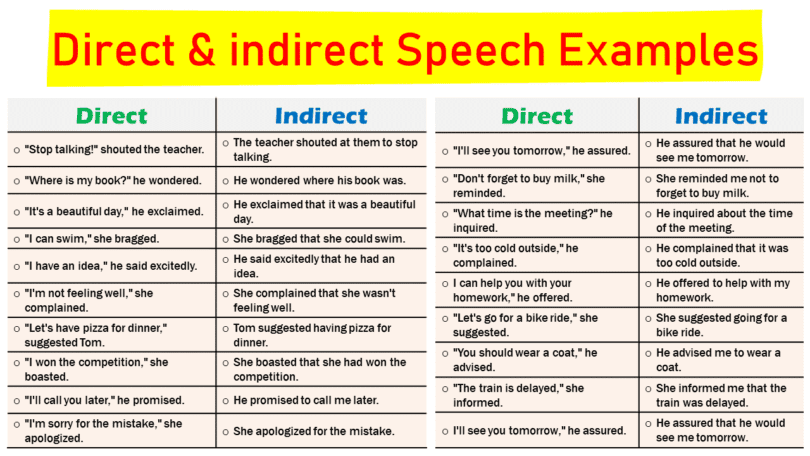
Well, it is really important to learn how people talk in their daily lives. Let’s describe the main difference between direct and indirect speech examples ! Direct speech is when we want to say exactly what someone else said, like quoting them. Indirect speech is a bit different, it is when we tell what someone said without quoting them directly. Understanding direct and indirect speech sentences can help us communicate effectively. For example, if someone says, I’m hungry, in indirect speech, we can say, They said they were hungry, in indirect speech.
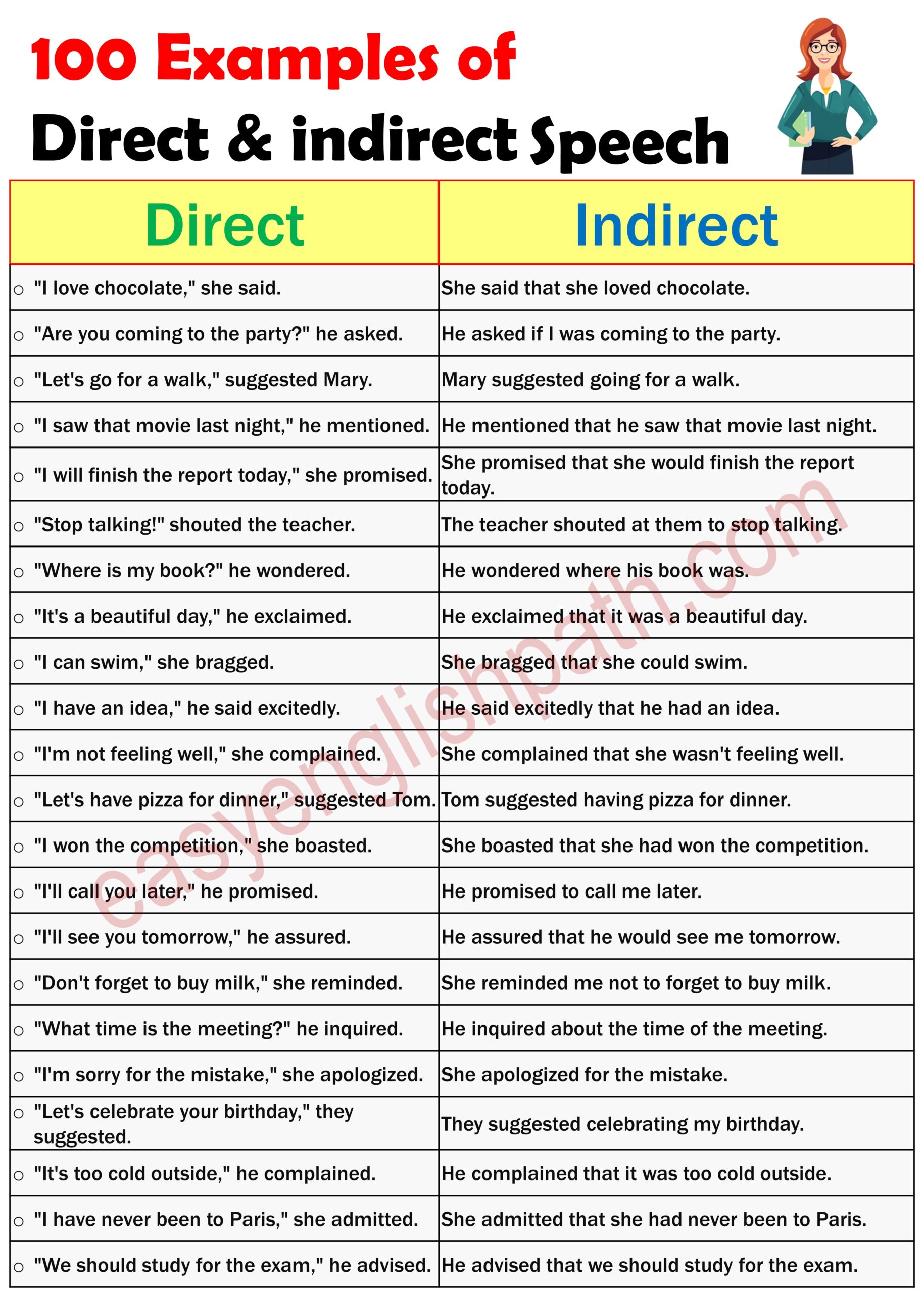
Direct and Indirect Examples
Direct and Indirect Speech Examples
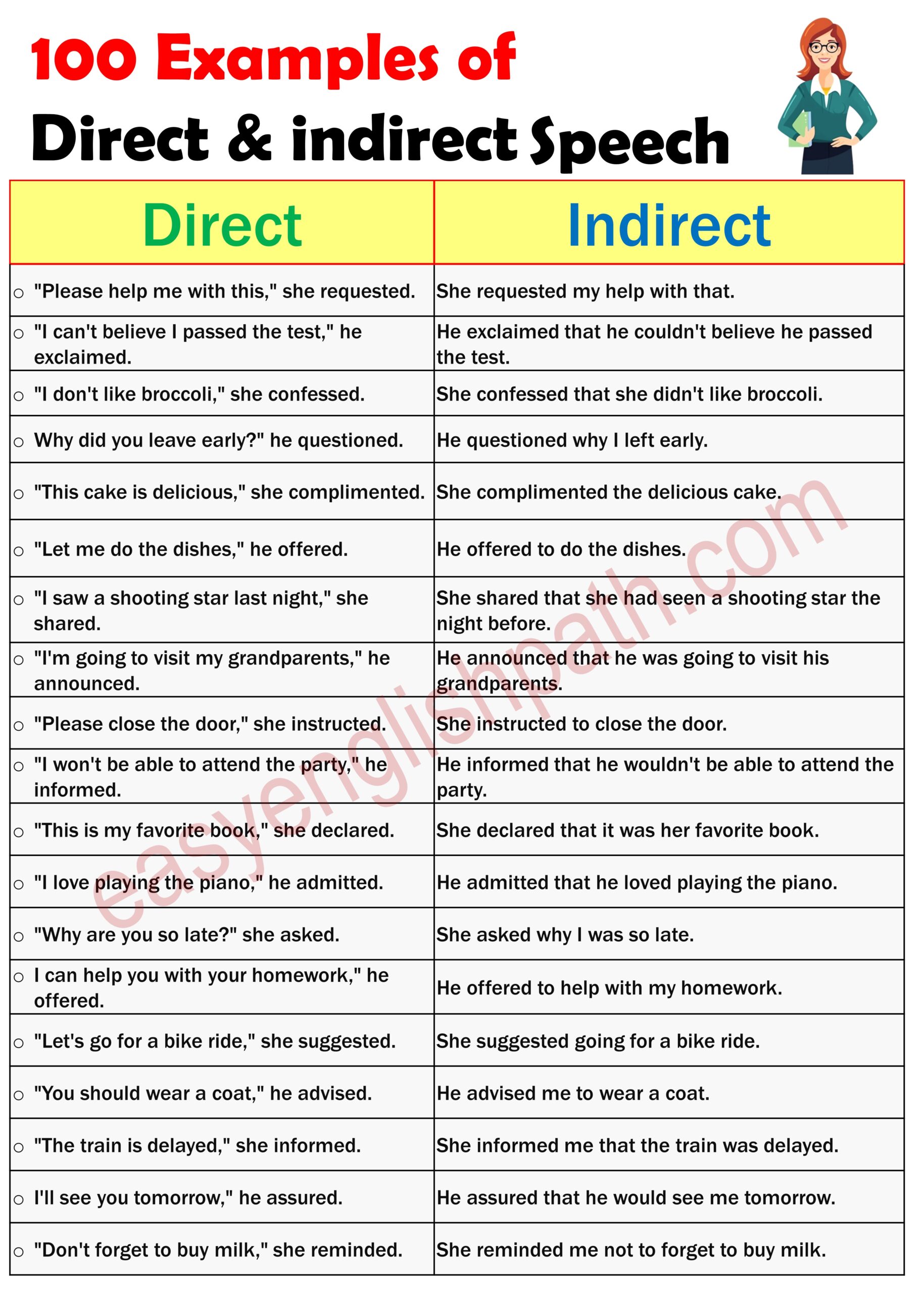
You May Also Like
- “Used to” Examples Sentences
- 100 Pronoun Examples in English
- Prepositions Sentences Examples
You may also like
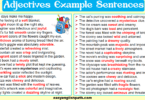
150 Adjective Examples Sentences In English
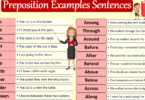
100 Preposition Examples Sentences In English
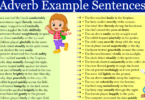
100 Adverb Examples Sentences in English
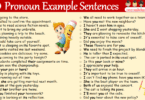
100 Pronoun Examples Sentences in English
Examples of 'speech' in a sentence
Examples from collins dictionaries, examples from the collins corpus.
Quick word challenge
Quiz Review
Score: 0 / 5

All ENGLISH words that begin with 'S'
- Cambridge Dictionary +Plus
Examples of speech

Word of the Day
Your browser doesn't support HTML5 audio
a name someone uses instead of their real name, especially on a written work

Hidden in plain sight: words and phrases connected with hiding

Learn more with +Plus
- Recent and Recommended {{#preferredDictionaries}} {{name}} {{/preferredDictionaries}}
- Definitions Clear explanations of natural written and spoken English English Learner’s Dictionary Essential British English Essential American English
- Grammar and thesaurus Usage explanations of natural written and spoken English Grammar Thesaurus
- Pronunciation British and American pronunciations with audio English Pronunciation
- English–Chinese (Simplified) Chinese (Simplified)–English
- English–Chinese (Traditional) Chinese (Traditional)–English
- English–Dutch Dutch–English
- English–French French–English
- English–German German–English
- English–Indonesian Indonesian–English
- English–Italian Italian–English
- English–Japanese Japanese–English
- English–Norwegian Norwegian–English
- English–Polish Polish–English
- English–Portuguese Portuguese–English
- English–Spanish Spanish–English
- English–Swedish Swedish–English
- Dictionary +Plus Word Lists
{{message}}
There was a problem sending your report.
- Collocations

IMAGES
VIDEO
COMMENTS
A part of speech (also called a word class) is a category that describes the role a word plays in a sentence.Understanding the different parts of speech can help you analyze how words function in a sentence and improve your writing. The parts of speech are classified differently in different grammars, but most traditional grammars list eight parts of speech in English: nouns, pronouns, verbs ...
The 9 parts of speech are adjectives, adverbs, conjunctions, determiners, interjections, nouns, prepositions, pronouns, and verbs. (These are also known as "word classes.") A Formal Definition. A "part of speech" is a category to which a word is assigned in accordance with its syntactic functions. In English, the main parts of speech are noun ...
Knowing the different parts of speech is essential for good grammar. Become an expert at knowing when and what parts of speech to use with these examples. ... These example sentences show articles and determiners in bold, while the nouns they modify are underlined. The detective asked me some questions.
A verb is one of the most important parts of speech and is a word that is used to describe an action. There are three main types of verbs which are detailed below. Examples: Walk, is, seem, realize, run, see, swim, stand, go, have, get, promise, invite, listen, sing, sit, laugh, walk…. Verb example sentences:
The parts of speech refer to categories to which a word belongs. In English, there are eight of them : verbs , nouns, pronouns, adjectives, adverbs, prepositions, conjunctions, and interjections. Many English words fall into more than one part of speech category. Take the word light as an example.
Also known as word classes, these are the building blocks of grammar. Every sentence you write or speak in English includes words that fall into some of the nine parts of speech. These include nouns, pronouns, verbs, adjectives, adverbs, prepositions, conjunctions, articles/determiners, and interjections. (Some sources include only eight parts ...
8 Parts of Speech Definitions and Examples: 1. Nouns are words that are used to name people, places, animals, ideas and things. Nouns can be classified into two main categories: Common nouns and Proper nouns. Common nouns are generic like ball, car, stick, etc., and proper nouns are more specific like Charles, The White House, The Sun, etc.
Words with More Than One Job. Many words in English can have more than one job, or be more than one part of speech. For example, "work" can be a verb and a noun; "but" can be a conjunction and a preposition; "well" can be an adjective, an adverb and an interjection.
In the above example, the subject contains an adjective ( migratory) and a noun ( birds ), and the predicate contains a verb ( fly ), a preposition ( to ), and a direct object ( Florida ). In this section we will examine the different parts of a sentence including: subject, predicate, object, complement, phrase, and clause. Printer-friendly ...
Direct And Indirect Speech Examples. While using English, we use direct and indirect speeches quite often. If a sentence is expressed exactly as it came out of the mouth of the person who said it, it becomes a direct speech. However Indirect Speech (also called reported speech) refers to transmitting a sentence that someone has said.
Based on use and functions, words are categorized into several types or parts of speech. The 8 main parts of speech in English are: Noun. Noun definition: A word used to identify any of a class of people, places, or things, or to name a particular one of these. Noun examples: lady, road, tree, love, dream, pencil, Bob, Mary. Noun example sentences:
Further Reading. The Parts of Speech Examples (127 Mixed Sentences): arts of speech are the building blocks or components of a sentence. All words belong to one part of speech or another; there are eight parts of speech in all. Knowing what they are will help you choose your words wisely and use them correctly in your writing.
2) Simon Sinek. Speech ending line: "Listen to politicians now, with their comprehensive 12-point plans. They're not inspiring anybody. Because there are leaders and there are those who lead. Leaders hold a position of power or authority, but those who lead inspire us.
Examples of speech in a sentence, how to use it. 98 examples: The ministers have abandoned all other state worries for a careful censure of…
In a speech to the House of Representatives at this same time, Congressman Davy Crockett told the story of getting chewed out by a constituent for voting for a $20,000 emergency relief bill for the homeless in a city just wiped out by a fire. 5. 4. They differed from them in speech, dress, and disposition.
Direct Speech. Indirect Speech. "I love chocolate," she said. She said that she loved chocolate. "Are you coming to the party?" he asked. He asked if I was coming to the party. "Let's go for a walk," suggested Mary. Mary suggested going for a walk. "I saw that movie last night," he mentioned.
We welcome feedback: report an example sentence to the Collins team. Read more…. Sadly she seemed to lose the power of speech and the ability to read. The Sun. ( 2010) He gave his acceptance speech in the college hall. The Sun. ( 2013) No constitution in history has been more uncompromising about free speech.
Examples of SPEECH in a sentence, how to use it. 95 examples: In political speeches and policy documents the tensions between equity, need…